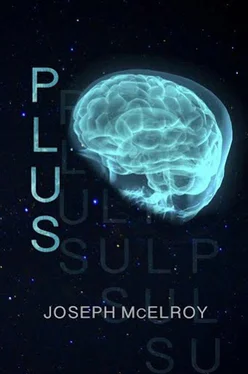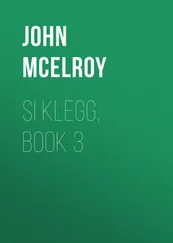Below — as if far below — the dart was not to be seen where its blue discharge had accompanied the Dim Echo’s last report (Hypothalamus active) .
Below that was the gland of flame from which he kept his distance furled. The flame was now less furled yet far less bright. But with a light not only lower but more a different light.
The fields of swaying beating tufts of sea hairs went all over. But Imp Plus did not.
He did not look outside for the limbs and the slivers. Did not check algae and the window that had no reticle on it to measure position. Did not see if he could now work the lines to the gauges. Or to Earth.
He made himself into a grip. He was on the soft gray and the glue-white.
Once not long ago he had gone down one side and up out the other. But now he reached fore and aft. The heart that pulsed the pulses was, he thought, the brain. That must be it.
He alone knew. Then he would tell Ground. To see what Ground would say. Yet he wanted not to tell Ground.
The fields of many-waving tufts touched Imp Plus as he opened his grip along a fore-and-aft axis. He did not know where on him these sea hairs touched him, that were part of him. The soft gray and the glue-white still held amber lumens of Sun. These lumens were not packets now. They were one suction everywhere. The hand of the Sun was withdrawing, but it left what its light had become in the store of the brain.
His grip took the lead of his own sight. He did not know what led what, though he was in on it. And now the undulant fields of tufted net-space that had grown by discovery from ladderwork that was straight, then round, then everywhere, now singled out at each end of the curved calipers of his grip into a plow like cross-rung of force.
Yes. A rung, a bar. But a space. A short space alive. Between poles more live than the separated bulbs of an electric eye. Poles fed by a charge of process turning each constantly from positive or negative to both.
Rung or bar impaled on each fork of will plowed silently down and in. Rung, bar, or detached radius.
While way below him, below a fibrous head of membrane nibbling a long gap, below also a point of pink ventricle shimmering between two outer ventricles which now with the ebbing of the Sun seemed distinct, separate, equal shapes of upright fish or ripe-tailed dolphins facing to dance — and below and in front of the once discolored, now shadowed crossing of the eye tracts was the unfurling and more banked gland of flame which still warmed into brown, maroon, and amber boundaries four bodies which were one and were where the blue dart had once brightly cut.
At that point of the blue dart’s pain the Dim Echo had said some part was active. If those bodies or islands down above the flame were where the Dim Echo had meant, the word for the part did not matter. Round the straight line of the Dim Echo’s data Imp Plus could spin a spiral even if he could not laugh. The California woman’s hand had run a spiral ladder up his spine. Later she brought the small brown of her nipples up to him to turn into one whole face then the loin of its open mouth then the multiplied nipplets of her velvet tongue: and all brought with them that desire that dissolved into its own unknown the fear of what was to come: the divided operating table that bent up from table to chair and back to table at the end, and earlier the brown-faced nurse slipping a hypo in the bend of his arm as if to take out of him what it was that made him not go with everything else.
He had many bends — he saw them — but no arm. And if the part the Dim Echo had named was what the blue dart had been in, these bodies down above the gland of flame were not one part but four. And clusters at that. For the time being.
From these families and from all the turning cavities and colored motions Imp Plus saw, the Sun’s ray was retiring. Imp Plus recalled that the blond and ash-red, green-gilded or silvered yellow did not belong to the planes and chambers, spindles, gaps, sacs, drops, and pored skins that held them like a million bloods of the Sun. But some of the sea hairs got thick, then narrowed in a relay other than their swaying, and thickened into a lenslike transparency as if pumping the color elsewhere only to contract into color again. And the color here or down the planes or swelling the drops might show orange or blue-green from a point beneath, but then be chalky brown or singed pink from higher off — say, ten o’clock. Ten o’clock came to him. A word for a place to see from. Did the colors belong to all these parts? The parts and their colonies, whose color varied with where they were seen from, knew how to hold their color or if not their color their ties to it and to the Sun’s running airs.
But to Imp Plus?
His grip came into being. It was what he wanted. Fore and aft. Heading out, down, in. Leading the way the fore and after rungs arced out and away over hills made of the same twigs, spines, and feelers as before, and the same glue cells tonguing onto stems as before, when Imp Plus moved through the sides of the brain.
The light was less and less; so the sparks firing from twig across to branch made more glow. But dropping over opposite hills he wanted to reach and get the rungs back. For what he reached was that small hand from a distance he could not use. That hand was what he reached, a small hand seated on a huge, singing wheel that turned beside the sea. The small hand he reached was seated in a falling rung on a seat he could not now use.
The rungs arced out and down and in. The fore rung dropped more slow and not so deep as the after rung. It was like unequal growing. But his own. But what happened now made Imp Plus recall being tired, because he must be tired now by the twilight bedding the lantern canals and the colonies as if they did not know him going about their work whose gloaming use he would try to feel without the power of that pain now absent. For when both rungs reached a long chasm dividing everything gray, white, blue-green, and amber-red narrowly in two — and what lay below was not the brain — the rungs straddled the divide. But kept on moving. Now in. Working like bridges on rollers, on tracks along the banks of the chasm, and what lurked below and was not the brain could still be seen from the frontal rung but not now from the rear rung. But what happened to tire Imp Plus was that he felt not in two places at once. Except this was not what was tiring, but offered the reverse. While what he saw ought to be tiring was the rungs. Which bridged a divide he now saw down through only by working through the cells where the two sides of the fissure met. But what was worse than tiring was then not really the difference between fore and aft; not between the same nerve and glue cells in front, and these and new cells in back; or between the new, long bulb-tipped horseshoe limbs inside which the fore rung now ran — and the climbing fibers and mossy fibers, radiating stars, baskets, and seaweed tuning forks among whose frequent right angles the rear rung passed like air in foliage. (He did not know foliage.) What was other than tiring was that the rungs thought their way along all this independent of him.
Or what was tiring was the need to be at two points when he felt in one. He was not equal to it. But they in their increase or motion were not equal to each other.
These two. Fore and aft, through which two arms or ends or pincers moved now toward each other. And absently: for what did he get from this will to grip? Or what did it touch or do up among the tangled backward-tending tendrils split out from the horseshoe limbs he thought (and knew he thought) were old nerves of smell; and what did this gripping will touch or do back among planes of tree-branch folia, planes like flattened leaves, and among folds so many, so packed, so fine their slowed cycles and endless-fingered special bodies were ready to be reached by many motions at once and be the monitor or balance or union of these things.
Читать дальше












